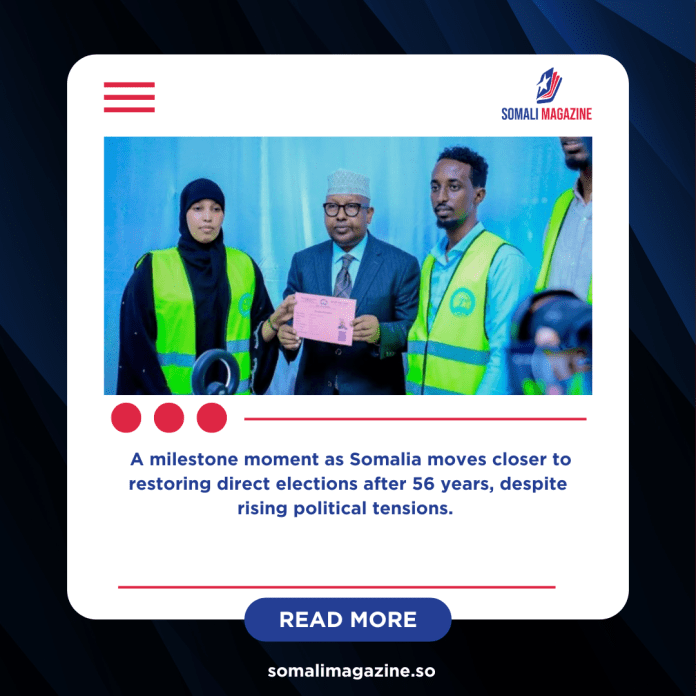Facebook Twitter (X) Instagram Somali Magazine - People's Magazine
Somali Minister of Defence Ahmed Moallim Fiqi on Tuesday officially registered as a voter at the National Independent Electoral Commission centre in Galkacyo, located in the Mudug region. After receiving his voter registration card, he encouraged Somalis across the country to take part in the ongoing voter registration exercise, stressing that participation is essential in choosing leaders who genuinely represent the people at all levels of government.
Fiqi described the moment as both personal and historic. He noted that this is the first time in 56 years that Somalis are regaining the direct right to vote, a right that had long been out of the hands of ordinary citizens due to decades of conflict, instability, and indirect electoral systems. He said registering to vote symbolises a major step in strengthening Somalia’s democratic path and rebuilding state institutions that rely on public legitimacy. According to him, the act of registering is not only about receiving a card—it is about acknowledging the people’s voice as the foundation of governance.
He also highlighted that building a functioning system of one-person-one-vote requires active public involvement. He urged all eligible Somali citizens, especially those in areas where registration centres have opened, to take advantage of this opportunity. Fiqi said that successful elections depend on turnout, trust, and unity, and that this process marks the beginning of a more inclusive political era where leaders are chosen directly by the people rather than through the clan-based power-sharing formula used in previous years.
Despite the government’s optimism, the process has faced criticism from major opposition figures. Former presidents Sharif Sheikh Ahmed and Mohamed Abdullahi Mohamed Farmaajo have accused the government of moving ahead without national consensus. They claim the administration is making unilateral decisions on election procedures and timelines, raising fears of deepening political divisions. Both leaders have warned that if the government continues without broad agreement, they may consider organising a parallel voting process, a move that could complicate the national electoral roadmap and heighten tensions.
These disagreements reflect Somalia’s long-standing challenges with political unity, inclusive decision-making, and trust between key stakeholders. The country’s most recent election in 2022 followed the 4.5 clan-based system, where parliamentary seats were distributed among major clans and minorities rather than through direct voting. While the system has been used for years to maintain political balance, many Somalis view it as outdated and unrepresentative.
Fiqi’s registration symbolises a shift toward a more democratic and citizen-driven approach. He emphasised that the country is at a critical turning point, and the willingness of citizens to participate will determine whether Somalia can successfully transition to a fully democratic system. He described this new phase as essential for establishing a legitimate government that reflects the true will of the people and strengthens state institutions.
As the registration continues, the coming weeks will be important in determining whether the process moves forward smoothly or faces political pushback. Many citizens, leaders, and international observers are watching closely, hopeful that Somalia’s move toward direct elections will be handled with unity, fairness, and transparency. The Minister’s message was clear: participation is power, and this moment marks a new beginning for Somalia’s democratic future.

